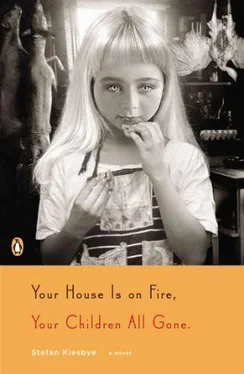I held the tub in my hands for a long time. Then I ran out, ran until I reached the Droste. I couldn’t think clearly, couldn’t distinguish the screams that ran through my head, the twitches within my body. Yet I hurled the pot as far as I could and yelled when it disappeared in the water. I had him. I had Friedrich Penck. He would see, he would see.
Friday night we climbed the walls of the old convent. Our faces were smeared with soot, our bodies draped in grotesque rags. We were the plague, the harbingers of the black death. We hid on what remained of the second floor, where we could see our victims but couldn’t be detected ourselves. This second floor was said to have housed the organ, which the Swedes had torn up and carried off. Now only a third of the wooden floor existed, and it wasn’t safe to walk on it unless you knew which beams could still carry weight.
We came at twilight, changed from summer dresses into ghoulish costumes, darkened our faces, and took our positions. The sun had not taken the heat with her, sweat smeared our fearsome paint. The air seemed full of wet smoke.
Käthe arrived first, just as we had planned, and just as we had instructed her in our letter, she installed herself in the shadows of the room below. She was muttering under her breath. Even though there wasn’t enough light left to see what she was wearing, we could smell her perfume from our high perch. Like lemurs, we hovered above her, watching her dark figure through cracks in the floor. She was a seer, but love had done its job and blinded her. Or maybe all she could see were ghosts, and our bodies were too young, our hearts beating too wildly, for her to detect us.
After fifteen minutes the apothecary approached the convent. We could see him cross the moor, a shadow darker than our liquid night. His feet soon scraped over the stone and steered toward the corner where Käthe was waiting for her alleged suitor.
For seconds I didn’t hear a thing, and even if the figures below had moved, I’m not sure I would have been able to hear them above the blood pounding in my ears. It is too dark, I told myself. It is too dark—I will miss out on my revenge. I raised my torso, ready to jump up and leave my lookout.
Just then we heard the apothecary’s voice. “Is it really you?” he said.
“Yes,” Käthe answered.
Maybe the apothecary understood immediately that it wasn’t Heidrun Brodersen who had come, because silence ensued. We couldn’t take any chances.
I gave the sign.
A torch lit up in Anke’s hand and she dropped it through the floor to the room below us, where dry branches and straw greeted and spread the flames.
“No,” Käthe shouted, clinging to the apothecary who tried to tear away from her grasp. “I’m here, I’m here!”
The fire ate its way toward them, and in the unsteady light our faces appeared above the fighting couple. “Lovebirds fly, spread your wings!” we howled. We ran along the walls, screeching and banging frying pans against the stone.
Finally Penck pushed the crying woman away and ran. “Run home to your wife,” we yelled and laughed after the fleeing apothecary.
Staggering after him, Käthe shrieked as much as we did. She wore a pink dress, one sleeve torn off from her struggle with Penck. She spun like a top, like a whirling dervish, but she couldn’t see us. The afterlife haunted her, but our faces, sooty and distorted, she could not read.
“Käthe,” we howled, “Käthe, run after your lover. Run or you’ll lose him.” We knew we were safe. “Käthe, where is your kiss?” We jumped off the walls and chased after her until we reached the first house of our village.
Käthe stayed hidden for a week, and when we saw her again in the street, words sprang from her mouth like frogs, hopping away in whichever direction, too fast and slick to be caught.
Yet I wasn’t satisfied.
I had imagined my revenge for so long, and I hadn’t seen Penck suffer enough. I had barely seen him.
For a week, I expected him to show up at our door, insisting to talk to my father, but he never did. Each day, our prank seemed more childish to me, and I was ashamed of the memory of our darkened faces, the silly shrieks, and of how wonderful I had felt as the girls waited for me to give the sign to start the mayhem.
After another week I knew what more I had to do to. Before I left the house that afternoon, I felt my father’s hand on my shoulder, turning me around. He traced my scars with one of his thick, rough fingers. “They’re red,” he said. “What are you excited about?”
“None of your business,” I said.
His finger kept running over my face, a spider weaving its web. “If I could undo it.”
“Don’t worry,” I said. “It’s all forgiven.”
In the village square, people were gathered, their voices high, their mouths watering, and I soon found out what had happened. Käthe had attacked the Gendarm , begging him to arrest nine dead children who followed her around all day. She had bitten Mr. Schürholz’s hand, and he had taken her away to the station. It was a good moment for my mission, because Rosemarie Penck stood with her nose pressed against the apothecary’s window.
The door’s bell caused her to abandon her lookout and stare at me in surprise. “What do you want? You’re a thief, Linde. You’re not welcome here.”
This time I didn’t try to make conversation. I gave her the letter.
“What is it?” she asked.
“It’s for your husband,” I said.
“From whom?” She turned the purple envelope this way and that, then glanced quickly toward the back of the store. Her fingers already twitched with curiosity.
“I can’t say.”
Heidrun Brodersen was a charming woman, fat and gentle and with a way about her that turned heads and caused the men and boys of Hemmersmoor serious heartache. Our mouths were always running, but when she appeared, her big legs stepping as lightly as those of a child, perfume rising from her clothes, we stood silent, as though a deity we couldn’t grasp had touched us. One of her ancestors, she claimed, had been burned at the stake for bewitching the village and bringing on a drought. A toad was found at the bottom of the well, just as the dying woman confessed, and once it had been killed, water came rushing back to the village.
Heidrun had three daughters, Heike, Karin, and Waltraud, and we were after them, trying to grope them on their way home from school, pressing our noses against the Brodersens’ windows at night, sitting in the trees around their house. If we lucked out, one of the girls, who shared a bathroom on the second floor, would undress in front of us without closing the curtain of the small, slanted window. We liked to imagine they knew we were waiting in the dark and enjoyed performing for us. Heidrun kept large earthen flowerpots on one side of her yard, with rosebushes climbing out of them and spreading over the old stone wall that separated their yard from the Hoffmanns’. Many times, after catching glimpses of bare shoulders and white skin, we broke off a few blossoms and laid them out on windowsills or the front steps.
Only a year ago we had played with the girls in the woods behind the Black Mill, but ever since that summer they had changed. We could see their transformation but didn’t comprehend it. Karin and Waltraud wouldn’t let themselves be led into the forest anymore. Rather they waited to be invited to the movies or to a café in Groß Ostensen. The apprentices from Brümmer’s factory rode their mopeds through our village, and we watched helplessly as the girls got on and put their arms around them. We wanted to appear adult, but we didn’t have motorcycles or money. We were left to worship the Brodersen girls from afar.
Читать дальше












